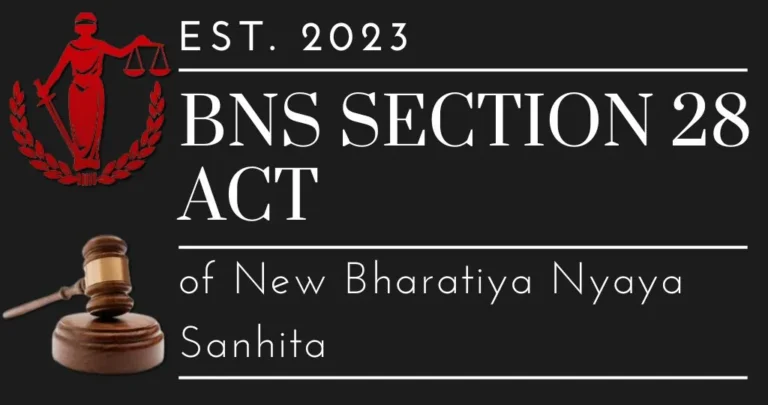
Understanding Joinder of Charges under Section 244: Flexible Charging in Criminal Trials
Understanding Joinder of Charges under Section 244: Liberal Charging in Criminal Proceedings
Introduction: Joinder of Charges under the Bharatiya Nagarik Suraksha Sanhita, 2023
Chapter XVIII of the Bharatiya Nagarik Suraksha Sanhita (BNSS) 2023 deals with how charges are presented in criminal proceedings. One significant feature of this chapter is the “Joinder of Charges,” which deals with cases where several charges can be consolidated into a single trial, particularly in cases of complex or overlapping offenses. Section 244 plays a significant role in explaining how and when such charges can be consolidated, even when there is some uncertainty about the precise nature of the offense.
For More Updates & Regular Notes Join Our Whats App Group (https://chat.whatsapp.com/DkucckgAEJbCtXwXr2yIt0) and Telegram Group ( https://t.me/legalmaestroeducators ) contact@legalmaestros.com.
For general reading of joinder of charges, you can read the précis of earlier provisions given in an earlier article on Live Law Hindi.
Section 244(1): Drafting Multiple Charges in Cases of Doubtfulness
Section 244(1) of BNSS, 2023, deals with cases where an act, or a series of acts, may possibly fall under several different offenses, but it remains doubtful which precise offense(s) the evidence will finally substantiate. In such situations, the law permits the prosecution to put all possible offenses into the frame at the same time or to charge the accused alternatively with any one of those offenses. This provision allows the trial to go ahead even if there is doubt which particular offense the evidence may ultimately support.
For example, where a person is alleged to have committed an offense that could either constitute theft, receiving stolen property, criminal breach of trust, or cheating, all these offenses can be charged together, or they can be charged alternatively. This is convenient in handling the complexity that can arise during the course of criminal trials so that the accused can be prosecuted for the appropriate offense after all evidence has been placed before the court.
Example Scenario:
Take the case of an accused person (A) who is caught in possession of suspected stolen property. A’s conduct may invite several alternate offenses, e.g., theft, criminal breach of trust, or receiving stolen property. As it is not known at first which accusation will be proved by facts, the court may set out all possible charges jointly, reserving to itself later to specify the exact offense once more facts come to light during the trial.
Section 244(2): Conviction for a Crime Not Initially Charged
Section 244(2) also enhances the court’s ease in dispensing justice by facilitating the conviction of an accused person for a crime that wasn’t specifically charged, provided that evidence proves that the person actually perpetrated that crime. This comes in handy where evidence brought to the court warrants an alternative explanation for the act rather than the original one. This provision makes sure that justice is not obstructed just because the particular offense was not originally charged, provided that the nature of the act falls under the potential offenses described in Section 244(1).
This section is useful in situations where, say, a person is originally charged with theft, but evidence adduced later in court shows that the crime better fits the description of criminal breach of trust or receiving stolen property. In such a situation, even though the accused was not originally charged with criminal breach of trust, they can still be convicted on the evidence.
Illustration of Section 244(2):
If A is accused of theft but the evidence at the trial indicates that the offense was criminal breach of trust or receiving stolen property, A can be convicted of either offense. The intention behind this provision is to make sure that even if the precise charge was not framed in the first place, the accused can still be given the appropriate punishment according to the actual evidence.
Examples Illustrating the Applicability of Section 244
To better understand how these provisions function, let’s look at a few examples:
Theft or Criminal Breach of Trust: If A is charged with a crime that may be either theft, criminal breach of trust, or receiving stolen property. According to Section 244(1), the prosecution can charge A with all three offenses, or one of them. This serves to cover any uncertainty that may be caused by the evidence, so that the accused can be appropriately convicted depending on what the facts of the case are at the time of the trial.
Contradictory Statements (Illustration c): In yet another case, if a witness (A) gives two conflicting statements, one in the Magistrate’s court and the other in the Sessions court, about B’s actions, A can be prosecuted for providing false evidence. Even if it is not clear which of the two statements is false, the court is entitled to convict A under the charge of intentionally giving false testimony, as one of the two statements must be false.
Several Offenses to Be Charged (Illustration b): If A is charged with theft alone but from the evidence, it can be proved that the offense was criminal breach of trust, A may be convicted of criminal breach of trust even if charged with theft alone to begin with. This option benefits the prosecution by allowing it to modify the charge according to evidence so that justice is not left astray.
Role of Section 244 in Criminal Trials
Section 244 of the BNSS, 2023, is an important provision because it allows the judiciary to move forward in cases where there may initially be uncertainty regarding the precise offense. By allowing multiple or alternate charges, the section establishes a tool to ensure that no criminal action goes undetected merely because of technicalities or initial uncertainty regarding the precise offense. It protects the right of the prosecution to change charges in light of the facts that come out, thus fostering a more equitable and responsive system of justice.
Additionally, by providing for a conviction even if the charge was not made at the outset, the provision guarantees that the judicial process is not bound by technicalities. Both society and the judicial system are improved by this approach since it promotes fair trials and supports the maintenance of public confidence in the ability of the legal system to deliver justice.
Conclusion
The provisions under Section 244 of the BNSS, 2023, focus on the flexibility of the legal system in dealing with complex criminal cases. By providing for joinder and alternative charges, the section brings about flexibility in prosecuting crimes that may at first sight be uncertain. Through examples, it’s apparent that such an approach facilitates encompassing various aspects of criminal liability in a single proceeding, finally favoring justice and judicial effectiveness.






